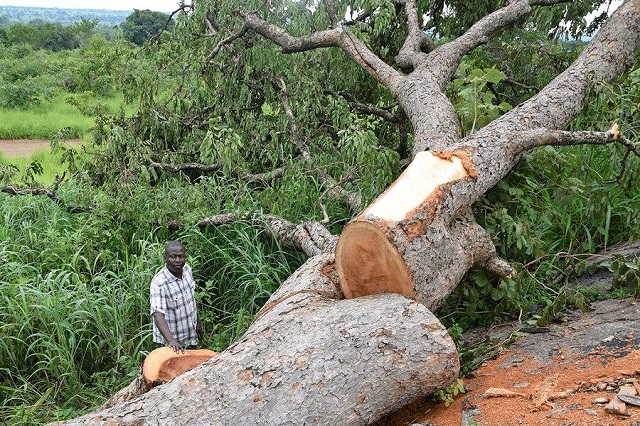
Gulu, Uganda | THE INDEPENDENT | Shea nut trees are among the traditional tree species known for medicinal, food value, economic, and cultural significance in Acholi sub-region.
However, shea nut trees which are also known to make quality coal have come under threat in the wake of a growing demand for charcoal as an alternative source of fuel. Environmentalists are worried that the alarming destruction of shea nut trees may see the trees extinct, regardless of the stringent policies put in place by both the central government and the district local governments.
For instance in 2018, the government through the Ministry of Water and Environment banned the cutting, transportation and sale of shea nut and Afzelia Africana tree logs and their products. The region had witnessed a surge in the destruction of the tree species owing to the lucrative market Afzelia Africana trees were fetching at the time.
At the time, nine perennial tree species in the district were considered endangered and thus barred from being destroyed. They include tamarind, wild plum trees, mango trees, black plum, shea nut, Afzelia Africana, hard cedar mahogany, and sausage tree among others.
But in Pader and Agago districts which are blessed with the bulk population of shea nut trees in the Acholi sub-region, such government directives haven’t helped curtail the vice over the years. Instead, an all-time surge in the destruction of shea nut trees is being registered in the areas of Puranga, Lapul, Pajule, Angagura, Awere sub-counties in Pader district and Adilang, Wol sub-counties in Agago district.
Pader district chairperson Godfrey Oringa Largo told Uganda Radio Network that a recent investigation found that more than 100 mature shea nut trees had been cut down in Abalokodi village in Puranga sub-county while hundreds of others have been cut down in the sub-counties of Angagura and Pajule.
He says the district made strides in the past through banning the destruction of perennial trees especially shea nut and Africana Afzelia and sales of charcoal but the vice has gone unchallenged due to high poverty levels.
Largo says a recent draft ordinance on Food Security and Environmental protection which was passed by the local government council and presented to the Attorney General hasn’t been approved. The draft seeks to address the problems of food insecurity and environmental protection in the district.
The alarming destruction of the forest cover in the district has now irked the cultural leaders who have sprung up to act.
John Peko Lugai II, the Palwo clan chief says his chiefdom has started forming a structure within all the sub-county levels to help in monitoring shea nut tree cutting. He says that his team will liaise with the district committee on land and natural resources to ensure a strong coordination to fight deforestation.
Rwot Lugai however expressed worry that their fights may go in vain due to the growing numbers of commercial charcoal dealers who have strong protection from state agents.
Martine Okello, the Pader District Forestry Officer attributes the current large scale destruction of trees to among others, the recent COVID-19 pandemic coupled with unending land wrangles. He says the district has currently embarked on investigating the destruction of the trees with data already being collected on the numbers of trees destroyed and suspects behind the vice.
Agago Resident District Commissioner Andrew Onyuk however blames some of the district bylaws on charcoal which allow for payment of fines and revenue charges on culprits found in illegal possession of forest products. For instance, Onyuk says charcoal traders freely exit the district after paying 500,000 Shillings and another 500,000 Shillings at the district as revenue, a decision he says has legitimized the charcoal trade.
Onyuk says his office is taking a firm stand on abolishing commercial charcoal production to save the environment. He notes that several suspects have been arrested recently in operations conducted by the police and remanded over environmental destruction charges.
In 2019, the Joint Acholi Sub-Regional Leaders-Forum drafted a charcoal policy for Acholi sub-region seeking to curb the cutting of endangered tree species and giving solutions for alternative sustainable charcoal production in the region. But nearly two years after drafting the bill titled “The Acholi Sustainable Charcoal Production and Marketing Bill, 2019,” only Kitgum district local government council have passed the bill into law.
Arthur Owor, a researcher with the Center for African Research in Gulu city believes that the wanton cutting of endangered trees can be controlled if all the local governments pass into law, the charcoal policy drafted in 2009. Owor says the bill will help to harmonize operation of the districts with a common interest in curbing the vice.
He however points out that week penalties for culprits of environmental destruction especially charges of fines amounting to 20 currency points (400,000 Shillings) remains a challenge in stopping tree destruction.
Despite being trusted to enforce environmental protection, a section of security personnel within the region have been accused of instead siding with charcoal dealers and loggers to degrade the environment. For instance on Wednesday, the police in Lamwo district arrested Julius Mpande, the Officer in Charge of Operations at Kitgum central police station over illegal logging.
Mpande is accused of entering an agreement with the Local Council chairperson of Guriya East in Lokung sub-county to fell trees for charcoal. At least 12 suspects are currently on remand at Kitgum government prison in Kitgum district and Patongo government prison in Agago awaiting sentencing over environmental destruction in Lamwo and Agago districts respectively.
*****
URN
 The Independent Uganda: You get the Truth we Pay the Price
The Independent Uganda: You get the Truth we Pay the Price


